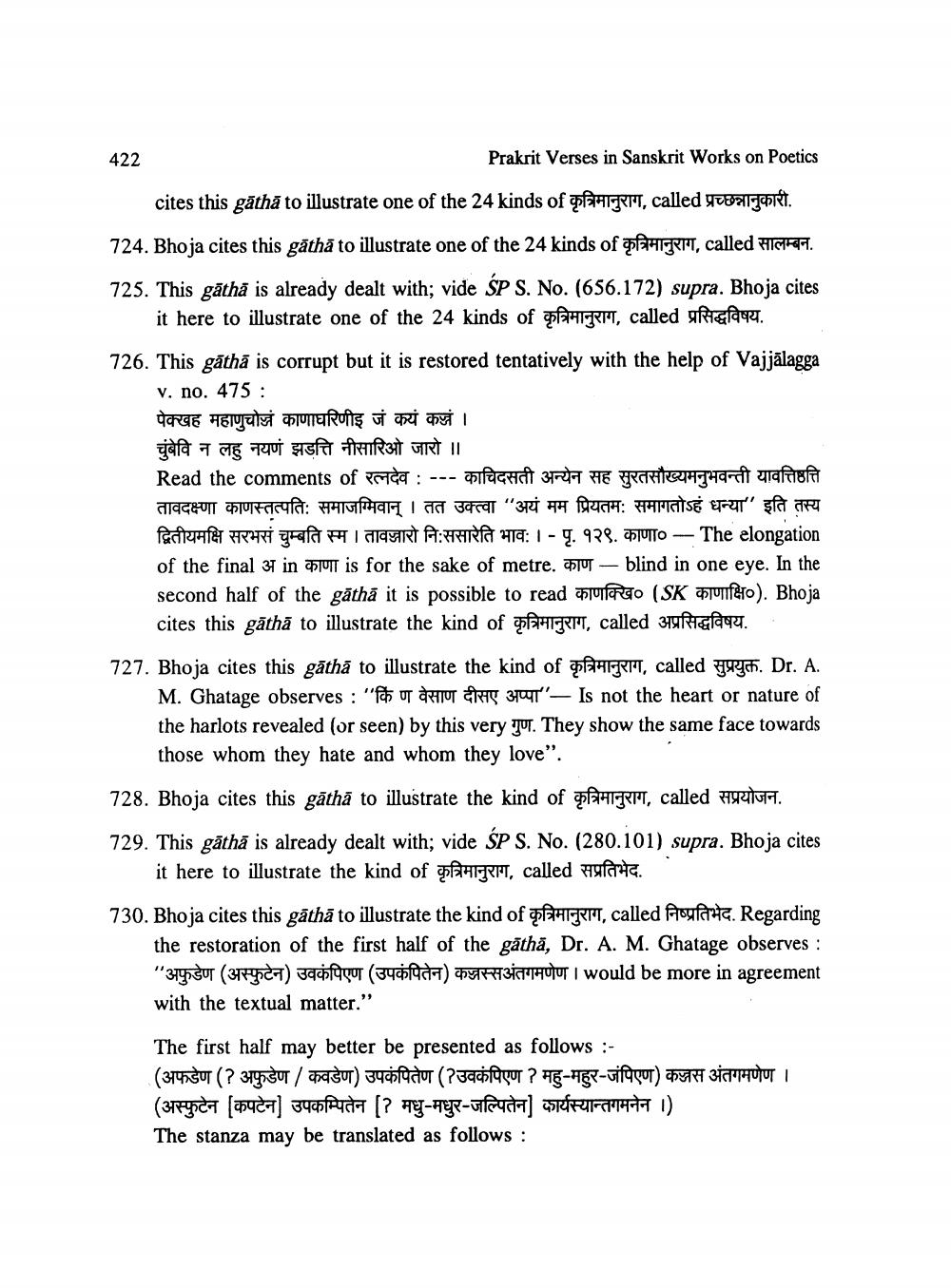________________
422
Prakrit Verses in Sanskrit Works on Poetics
cites this gatha to illustrate one of the 24 kinds of कृत्रिमानुराग, called प्रच्छन्नानुकारी.
724. Bhoja cites this gātha to illustrate one of the 24 kinds of कृत्रिमानुराग, called सालम्बन.
725. This gātha is already dealt with; vide SP S. No. (656.172) supra. Bhoja cites
it here to illustrate one of the 24 kinds of कृत्रिमानुराग, called प्रसिद्धविषय.
726. This gāthā is corrupt but it is restored tentatively with the help of Vajjālagga
v. no. 475 : पेक्खह महाणुचोखं काणाघरिणीइ जं कयं कज्नं । चुंबेवि न लहु नयणं झडत्ति नीसारिओ जारो || Read the comments of रत्नदेव : --- काचिदसती अन्येन सह सुरतसौख्यमनुभवन्ती यावत्तिष्ठत्ति तावदक्ष्णा काणस्तत्पति: समाजग्मिवान् । तत उक्त्वा "अयं मम प्रियतम: समागतोऽहं धन्या' इति तस्य द्वितीयमक्षि सरभसं चुम्बति स्म । तावज्जारो नि:ससारेति भाव: । - पृ. १२९. काणा० - The elongation of the final अ in काणा is for the sake of metre. काण- blind in one eye. In the second half of the gatha it is possible to read काणक्खि० (SK काणाक्षि०). Bhoja cites this gatha to illustrate the kind of कृत्रिमानुराग, called अप्रसिद्धविषय.
727. Bhoja cites this gatha to illustrate the kind of कृत्रिमानुराग, called सुप्रयुक्त. Dr. A.
M. Ghatage observes : "किं ण वेसाण दीसए अप्पा'– Is not the heart or nature of the harlots revealed (or seen) by this very go. They show the same face towards those whom they hate and whom they love".
728. Bhoja cites this gatha to illustrate the kind of कृत्रिमानुराग, called सप्रयोजन. 729. This gātha is already dealt with; vide ŚP S. No. (280.101) supra. Bhoja cites
it here to illustrate the kind of कृत्रिमानुराग, called सप्रतिभेद.
730. Bhoja cites this gatha to illustrate the kind of कृत्रिमानुराग, called निष्प्रतिभेद. Regarding
the restoration of the first half of the gatha, Dr. A. M. Ghatage observes : "अफुडेण (अस्फुटेन) उवकंपिएण (उपकंपितेन) कज्जस्सअंतगमणेण | would be more in agreement with the textual matter."
The first half may better be presented as follows :(अफडेण (? अफुडेण / कवडेण) उपकंपितेण (? उवकंपिएण? मह-महर-जंपिएण) कज्जस अंतगमणेण । (अस्फुटेन [कपटेन] उपकम्पितेन [? मधु-मधुर-जल्पितेन] कार्यस्यान्तगमनेन ।) The stanza may be translated as follows:




